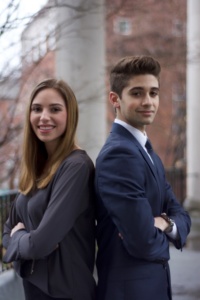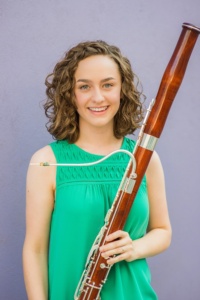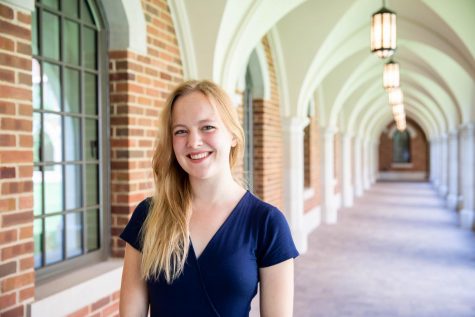The voting for College Council Presidents, Student Body President and Vice President general elections opened today at 8:00 a.m. and will close tomorrow at noon. Election winners will be announced in the Rand Lounge on March 21 at around 12:30 p.m.
The 2018 general election for student body president and executive vice president is between the Phyllis & Nico and Tariq & Lanier campaigns. Both emphasized financial inclusivity, visibility of VSG and raising student voices on campus as key issues in their platforms.
In addition to voting for president and vice president, students will vote for the individual college council presidents. The candidates for Arts & Sciences, Blair and Peabody are all running uncontested. The Engineering council president vote will take place at a later date.
The ballot also includes a referendum proposed by the student body senate. The referendum has two parts: first, it expands the election commision to facilitate smoother election processes, and second it adjusts the description of the Senate composition to allow VSG to reallocate positions to accommodate for the shift to the college halls system.
Before filling out a ballot, get to know the candidates’ platforms:
Vanderbilt Student Body President and Executive Vice President
 Phyllis Doremus and Nico Gardner
Phyllis Doremus and Nico Gardner
We believe that VSG is in a unique position to not only be a bold advocate for the student body but also provide for the betterment of the Vanderbilt student experience. We envision a VSG that serves a central connecting point for campus; empowering and supporting students and student groups as they seek to change the campus and the world around them. We stand for a VSG that is ready empower, uplift and serve the students of Vanderbilt.
[su_expand more_text=”Continue reading Phyllis and Nico’s platform.” height=”0″]Empower: We believe that Vanderbilt will only be successful when there are no financial barriers to opportunity and engagement. We recognize that VSG cannot solve the issue of financial inclusivity, but we want to work with students and administrators to create a campus that is accessible to students from all financial backgrounds. We seek to make sure all parts of campus, from student orgs to the UCC, are available to every student.
Uplift: VSG has a unique access to administrators that gives it direct ways to advocate for the student body. We do not believe that VSG is always in the best position to be lead advocate for the students. We want to give other student groups the same access to administrators in order to allow all students to build a campus that they can be proud of.
Serve: The core purpose of VSG is to make the day to day Vanderbilt experience better. We want to work with students and administrators to create a universal test bank, develop more professional development opportunities, make campus more accessible and empower first year students by connecting them to administrators.[/su_expand]
 Tariq Issa and Lanier Langdale
Tariq Issa and Lanier Langdale
This campaign is about moving forward together as a student body. We are committed to building relationships, increasing visibility, promoting inclusivity, cultivating student-wellbeing, and revitalizing VSG’s structure. Our campaign and this platform were inspired by and constructed in conjunction with conversations with 110+ students. It is key when reading this to know that Tariq and Lanier did not create this platform alone. Rather, it was students across all years and from different areas of campus that collectively contributed to these ideas.
[su_expand more_text=”Continue reading Tariq and Lanier’s platform.” height=”0″]Build Relationships: In order to be an effective intermediary between the administration and students, we must first understand the needs of the student body. VSG is the bridge between different sectors of campus; thus, we must build relationships with students. This will pave the way for a stronger VSG-to-student relationship and a stronger, collective student voice.
Increase Visibility: We believe that VSG must be more student-facing. Over the past few years, VSG has strived to be more transparent. We must now go one step further and be more visible and active on campus.
Promote Inclusivity: We are committed to leveling the playing field. We want to ensure that all students and organizations have equal opportunity to lay the foundation for success.
Cultivate Student Well-Being: What we all often forget is that everyone at this university is first and foremost a student. We will work to promote a greater student mental, academic, and physical well-being.
Revitalize VSG’s Structure: We are committed to addressing internal VSG issues that have been talked about for years. By improving VSG efficiency, we can streamline the process of creating a better, stronger Vanderbilt.[/su_expand]
College Council Presidents
 Alexis Gutierrez, for Arts and Science Council President
Alexis Gutierrez, for Arts and Science Council President
During my time at Vanderbilt, I have served our school through a variety of different leadership roles which have given me the opportunity to connect with students and hear their concerns. As President of Student Alumni Board and committee member on VSG’s Vanderbilt Ventures, I have seen the innovative power of the student body at work and have identified a common theme underlying this strength: diversity. While Vanderbilt has made great progress towards becoming a more equitable, diverse, and inclusive campus, there is still much work to be done. As President of Arts & Sciences College Council I will not only work to pursue this initiative but will also call for greater awareness regarding mental health as it relates to our campus culture. I am excited to be running for this position and hope I can count on your vote!

Brigit Fitzgerald, for Blair Council President
My focus as Blair council president would be on developing new projects and events while maintaining those already in existence. I would like to increase the communication between the council and the members of the Blair student body, in order to sponsor more student-run initiatives. In addition, I believe it is important to invest time in developing effective communication with students outside of Blair, in order to increase awareness of the Blair School of Music on campus. I am thankful to have served in various positions on the council for the past 3 years, and I hope to continue to serve the students of Blair in this way.

Grayson Rutherford, for Peabody Council President
I, Grayson Rutherford, am hoping for your vote to become your President of Peabody College. I seek to ensure connectivity between you and the administration as Peabody continues to improve its offerings and advance the lives of its students. As your President, I would propose the following initiatives for the 2018-2019 school year:
[su_expand more_text=”Continue reading Grayson’s platform.” height=”0″] Voice student recommendations about upcoming renovations to Peabody buildings. As the ultimate user of these facilities, we bring a perspective that will positively impact future Commodore experiences. I intend to host town-hall meetings between students and administrators to express concerns/suggestions before classrooms undergo restorations.
Promote mental health awareness through college-wide events. For example, I will collaborate with Peabody Administration and on-campus organizations to host de-stress festivals for Peabody students to engage and relax before finals each semester.
Improve public accommodations on Peabody’s campus for students with disabilities. Some Peabody buildings still do not fully comply with ADA requirements, so I will work with Vanderbilt Student Government and Vanderbilt Administration to enact a plan that allows all students to move freely and easily through campus and uphold a suitable learning environment.
Foster community for merit scholars. No formal interaction occurs beyond the classroom among Peabody students who are merit scholarship recipients. Working with the Peabody Administration, I will support collaboration between Vanderbilt scholars (Ingram, Chancellor, Cornelius Vanderbilt, Peabody) and national scholars (Posse, Stamps, etc.) through social programming and networking events that benefit all.
Thank you for your consideration and anchor down![/su_expand]
Senate Referendum
A referendum is being proposed by the student body Senate. If passed by a simple majority vote of the Vanderbilt undergraduate body, this bill will ratify the statutes and constitution of VSG. The referendum concerns the composition of the Senate and the number of members in various positions within VSG. Bolded words mark changes and strikethroughs indicate things that will be deleted should the referendum pass.
Read the full referendum text below.
[su_expand height=”0″]
Section II. The Senate
The Senate shall be composed of the Speaker of the Senate, the elected Academic Senators, the elected College Council Representatives and the elected Residential Senators and Senators as enumerated in the VSG Statutes. The powers of this body and the requirements of its members are given in Article IV of this document.
Section II. Elections
The Speaker of the Senate shall be elected according to Article III, Section 3, Clause 1 of this document.
All College Council Representatives Presidents shall be elected on the same day as the General Election for Student Body President.
Academic and Residential Senators shall be elected by the undergraduate student body in a plurality vote during the first six weeks of the Fall term, subject to election procedures outlined in the VSG Statutes. The Elections Commission Chair and Student Body President shall set the date of the election by the end of the preceding spring term.
All members of the Senate shall be elected on the same day, with the exception of the four College Council Representatives.
There shall be no more than thirty (30) voting members of the VSG Senate.
The Speaker of the Senate shall ask the Honor Council to appoint a non-voting representative prior to the VSG Fall Election.
Section I. The Membership and Structure of the Judicial Court
The Judicial Court shall consist of five (5) Justices who represent the student body. Justices shall not, concurrent to service, hold any other position within VSG. No person who has served as a Justice may be elected or appointed to any position external to the Judicial Branch of VSG.
Justices must have completed at least twelve (12) semester hours and shall be subject to the same minimum GPA requirements and criteria for membership as all other officers of VSG as prescribed in Article I Section III of this document.
Justices shall serve until they resign, become ineligible under Article I Section III of this document, or are impeached.
Members of the Judicial Court shall not be candidates nor be permitted to publicly support candidates for any elected office of VSG.
If the Judicial Court consists of fewer than three (3) sitting Justices, an ad hoc committee, composed of three (3) members of the Senate, three (3) members of the Executive branch, and two (2) at-large members shall nominate new Justices. The ad hoc committee shall be chaired by the Senate Honor Council Delegate. Members of the ad hoc committee will be chosen in accordance with Article III and overseen by the VSG Advisors. Applicants for the Judicial Court shall apply to the ad hoc committee via an application process. Nominees will be presented by the committee to the Senate and shall be confirmed by a two-thirds (2/3) vote of the Senate. If the Senate denies the nominees, the committee will reconvene to select new nominees. The committee shall only appoint enough Justices to reach the minimum threshold of three Justices. If/When the Judicial Court consists of three (3) or more sitting Justices, the sitting Justices shall select a nominee via an application process to fill each vacancy. Each nominee shall be subject to confirmation by a two-thirds (2/3) majority of the Senate.
If a vacancy in the Court is anticipated, the Judicial Court may initiate nomination and confirmation up to six (6) months in advance of the anticipated vacancy. A nominee confirmed in this way shall not begin serving as a Justice until a vacancy in the Court arises.
The Judicial Court shall elect a Chief Justice from among its members by the end of the spring semester of each year. If the office of Chief Justice becomes vacant, the Court shall immediately elect a new Chief Justice from among its members.
Section III. The Judicial Branch
The Judicial Branch shall be composed of five (5) Justices, one of whom shall serve as the Chief Justice. There shall also be a five (5) three (3) member Elections Commission, one of whom shall serve as the Elections Commission Chair. The powers of these offices and requirements of the members are given in Article V of this document.
Section V. The Membership and Structure of the Elections Commission
The Elections Commission shall consist of five (5) three (3) members. Elections Commission members must have completed at least twelve (12) semester hours and shall be subject to the same minimum GPA requirements and criteria for membership as all other officers of VSG as prescribed in Article I Section III of this document.
The Elections Commission Chair shall be nominated by the Justices via an application process and confirmed by a two-thirds (2/3) vote of the Senate. The remaining four (4) two (2) Elections Commission members will be nominated by the Elections Commission Chair from the applicant pool and confirmed by a simple majority the Senate.
Elections Commission members shall serve for one (1) academic year unless they resign, become ineligible under Article I Section III of this document, or are impeached.
The new Elections Commission Chair shall be subject to confirmation by the Senate prior to the last Senate meeting in the spring semester. The remaining two Elections Commission members will be subject to confirmation by the Senate at the last Senate meeting in the spring semester.[/su_expand]



